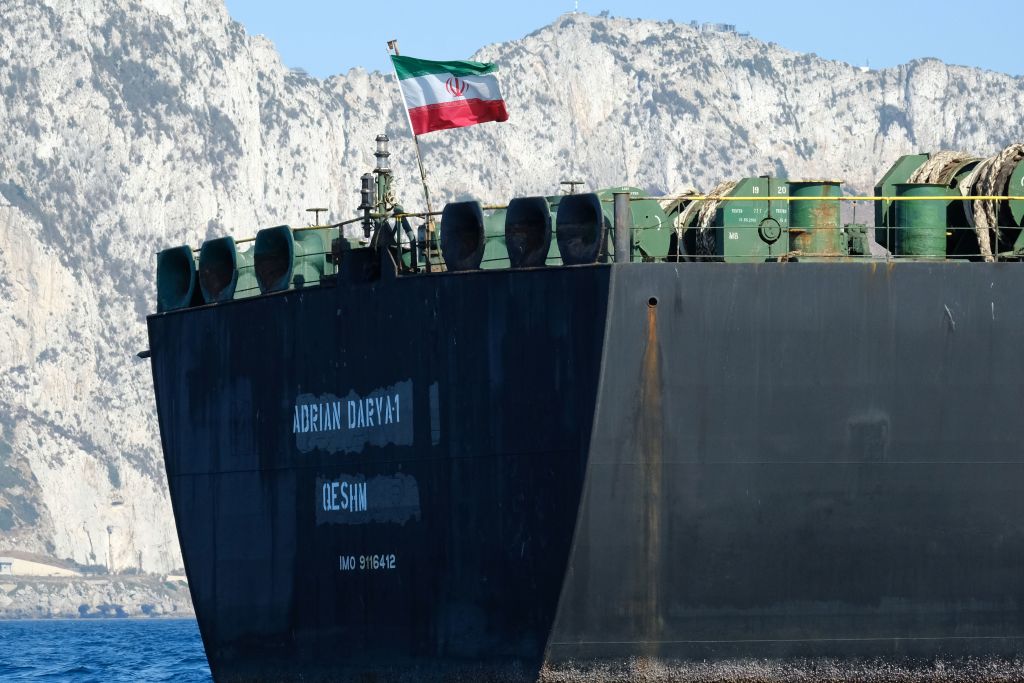The U.S. is now offering ship captains millions in cash to thwart Iran's oil exports. If that fails, it's threats.


A free daily email with the biggest news stories of the day – and the best features from TheWeek.com
You are now subscribed
Your newsletter sign-up was successful
Eleven days after Gibraltar released a detained Iranian oil tanker in mid-August, over U.S. objections, the ship's Indian captain got an email from a top U.S. State Department official offering him several million dollars to steer the ship to a port where the U.S. could seize it, the Financial Times reported Wednesday. The State Department then confirmed the offer and the new strategy to mix offers of cash and threats of sanctions or even jail to thwart Iranian oil shipments. "We have conducted extensive outreach to several ship captains as well as shipping companies," a State Department spokeswoman told AFP.
The ship's captain, Akhilesh Kumar, ignored the Aug. 26 offer of "good news" from Brian Hook, the head of the State Department's Iran Action Group, so Hook tried again. "With this money you can have any life you wish and be well-off in old age," he wrote Kumar two days later. "If you choose not to take this easy path, life will be much harder for you." Two days after that, on Friday, the U.S. slapped sanctions on Kumar and the ship, renamed the Adrian Darya 1. Iranian Foreign Minister Mohammad Javad Zarif called the emails "outright blackmail" after failed "piracy."
Hook told the Financial Times that he has emailed or texted about a dozen captains as part of the Trump administration's "maximum pressure" campaign against Iran, attempting to scare or bribe them to stop helping Iran sell oil abroad. A U.S. official told the paper the Trump administration has begun offering up to $15 million for information that disrupts Iran's illicit actives, using a 1984 program designed to counter terrorism.
The Week
Escape your echo chamber. Get the facts behind the news, plus analysis from multiple perspectives.

Sign up for The Week's Free Newsletters
From our morning news briefing to a weekly Good News Newsletter, get the best of The Week delivered directly to your inbox.
From our morning news briefing to a weekly Good News Newsletter, get the best of The Week delivered directly to your inbox.
A free daily email with the biggest news stories of the day – and the best features from TheWeek.com
Peter has worked as a news and culture writer and editor at The Week since the site's launch in 2008. He covers politics, world affairs, religion and cultural currents. His journalism career began as a copy editor at a financial newswire and has included editorial positions at The New York Times Magazine, Facts on File, and Oregon State University.
-
 6 of the world’s most accessible destinations
6 of the world’s most accessible destinationsThe Week Recommends Experience all of Berlin, Singapore and Sydney
-
 How the FCC’s ‘equal time’ rule works
How the FCC’s ‘equal time’ rule worksIn the Spotlight The law is at the heart of the Colbert-CBS conflict
-
 What is the endgame in the DHS shutdown?
What is the endgame in the DHS shutdown?Today’s Big Question Democrats want to rein in ICE’s immigration crackdown
-
 TikTok secures deal to remain in US
TikTok secures deal to remain in USSpeed Read ByteDance will form a US version of the popular video-sharing platform
-
 Unemployment rate ticks up amid fall job losses
Unemployment rate ticks up amid fall job lossesSpeed Read Data released by the Commerce Department indicates ‘one of the weakest American labor markets in years’
-
 US mints final penny after 232-year run
US mints final penny after 232-year runSpeed Read Production of the one-cent coin has ended
-
 Warner Bros. explores sale amid Paramount bids
Warner Bros. explores sale amid Paramount bidsSpeed Read The media giant, home to HBO and DC Studios, has received interest from multiple buying parties
-
 Gold tops $4K per ounce, signaling financial unease
Gold tops $4K per ounce, signaling financial uneaseSpeed Read Investors are worried about President Donald Trump’s trade war
-
 Electronic Arts to go private in record $55B deal
Electronic Arts to go private in record $55B dealspeed read The video game giant is behind ‘The Sims’ and ‘Madden NFL’
-
 New York court tosses Trump's $500M fraud fine
New York court tosses Trump's $500M fraud fineSpeed Read A divided appeals court threw out a hefty penalty against President Trump for fraudulently inflating his wealth
-
 Trump said to seek government stake in Intel
Trump said to seek government stake in IntelSpeed Read The president and Intel CEO Lip-Bu Tan reportedly discussed the proposal at a recent meeting
